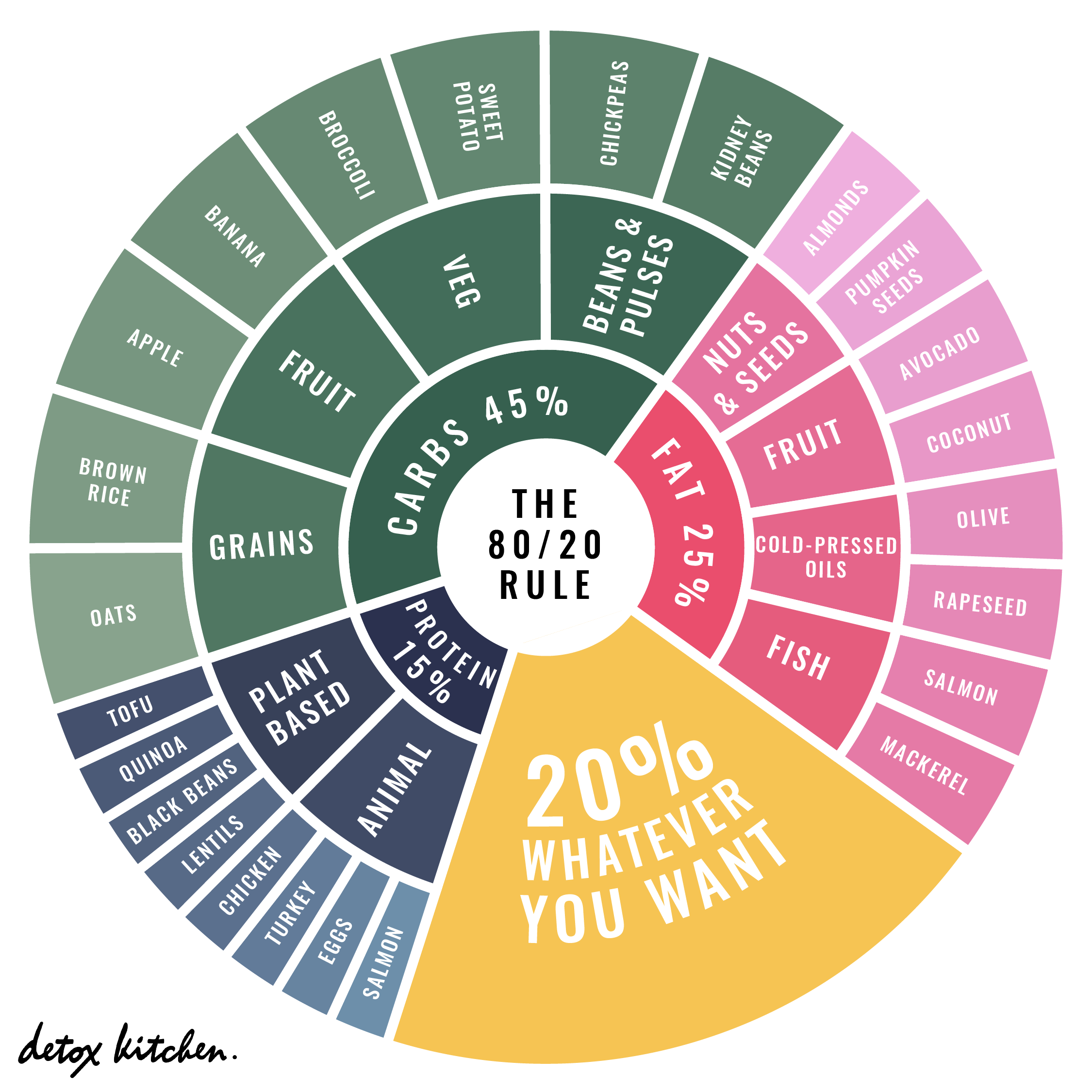24 Aug, 2020
The 80/20 diet for weight loss and weight management
HealthWe have been championing eating whole foods for the past decade and have seen first hand the positive effects that real food has had on our customers mental and physical wellbeing. We have awoken people to seeing how they can really feel, how they can be the best versions of themselves through eating a natural, predominantly plant based diet.
We want to take you on a culinary trail that starts with understanding what our bodies biologically need in order to be properly nourished, all the way through to ensuring that that nourishment comes from a diverse and delicious mix of ingredients and punctuates your day with joy.
When it comes to really understanding what a ‘healthy’ relationship with food looks like, we are strong believers in the 80/20 rule. It is pretty much the saying ‘everything in moderation’ put in practice. It is a simple guide that is easy to understand and implement into our everyday. There is no counting, no strict restrictions and no foods are off-limits, meaning you are far more likely to stick to this approach.
The 80/20 rule is not specifically related to how you compose every dish you eat but rather an approach that looks at what you have eaten over, let’s say, a week. It means that one day you might be feeling like you want to eat lighter salads and the next you want to indulge in a slice of cake. It gives you the freedom to make decisions on what you are consuming in a balanced and unrestrictive way.
In simple terms, if you are eating whole ingredients for 80% of the time, you can eat whatever you want (in moderation!) for 20% of the time and maintain a healthy, well-balanced diet.
So what should I eat for the 80% part?
To fully benefit from the 80/20 diet, make sure that your 80% days contain a variety of nutrient-rich foods. We’ve created this wheel to make it easier for you to understand what you should be filling your plate with:

Essentially a healthy diet includes a balance of nutrients that help to support all bodily functions. A balanced diet includes a combination of macronutrients which supply the body with energy. The three macronutrients are carbohydrates, fats and proteins. Most foods contain a combination of these macronutrients. These macronutrients can be gleaned from both animal and plant-based foods.
Carbohydrates should generally make up around 50% of your diet. But when we talk about carbohydrates we’re not talking about bread and pasta! The main source of carbohydrate in the diet should include starchy foods such as grains (e.g. brown rice, quinoa, buckwheat noodles, oats), sweet potatoes, and rye bread. Beans, pulses and lentils are also a source of carbohydrate (as well as protein – see below).
Fats should generally make up about 35% of your diet. Fat is used in the body as a way of storing energy in the body. Fat in food doesn’t necessarily make you fat – even though it contains more calories per gram than carbohydrates or protein.
There are several different fats found in the diet:
- Saturated fats are considered less healthy as in excess they can promote the build-up of cholesterol which can increase your risk of heart disease. These fats are found in convenience foods, full fat dairy, butter and sweet snacks.
- Monounsaturated fats are one of the healthiest and these are found in foods such as nuts, nut butter, seeds, olive oil and avocado. These fats help to lower cholesterol and reduce inflammation in the body.
- Polyunsaturated fats include omega 3 which is another healthy fat that has been shown to help support heart health by reducing inflammation in the body and thinning the blood to improve circulation. The majority of fat included in the diet should come from monounsaturated and polyunsaturated fats.
Protein should generally make up around 15% of your diet (though note that while protein makes up around 15% of the diet the minimum intake is 45g for women and 55g for men). Protein can help to fill you up and keep you feeling full which is why it is often a key consideration in weight loss diets. You don’t need lots of protein in your diet and the body can only absorb so much. In excess protein is converted to glucose and stored in the body as fat. People who work out a lot have a higher requirement for protein as do people who are sick. Protein is particularly important after the age of 50 as muscle mass starts to deteriorate.
Good sources of protein include poultry, salmon, eggs, tofu, quinoa, as well as beans and pulses.
A few considerations with the 80/20 diet
To succeed with the 80/20 diet for weight loss and weight maintenance, there are a few things you'll want to keep in mind:
- Firstly, the 20% isn’t an excuse to fully overindulge or binge. Think of it as a more relaxed approach to your healthy diet. Remember even your 20% days should be enjoyed in moderation, and if you overdo it then you can gain weight.
- Make sure you are also embracing other aspects of your health too. So regular exercise, keeping hydrated and getting enough sleep.
If you would like a helping hand with maintaining a realistic and flexible diet plan for weight loss, why not try one of our delicious healthy meal delivery plans,whether it's to kick-start healthy habits with a focus on whole carbohydrates benefits and nutrient-dense meals, it's easier to nourish your body without missing out on joy.



